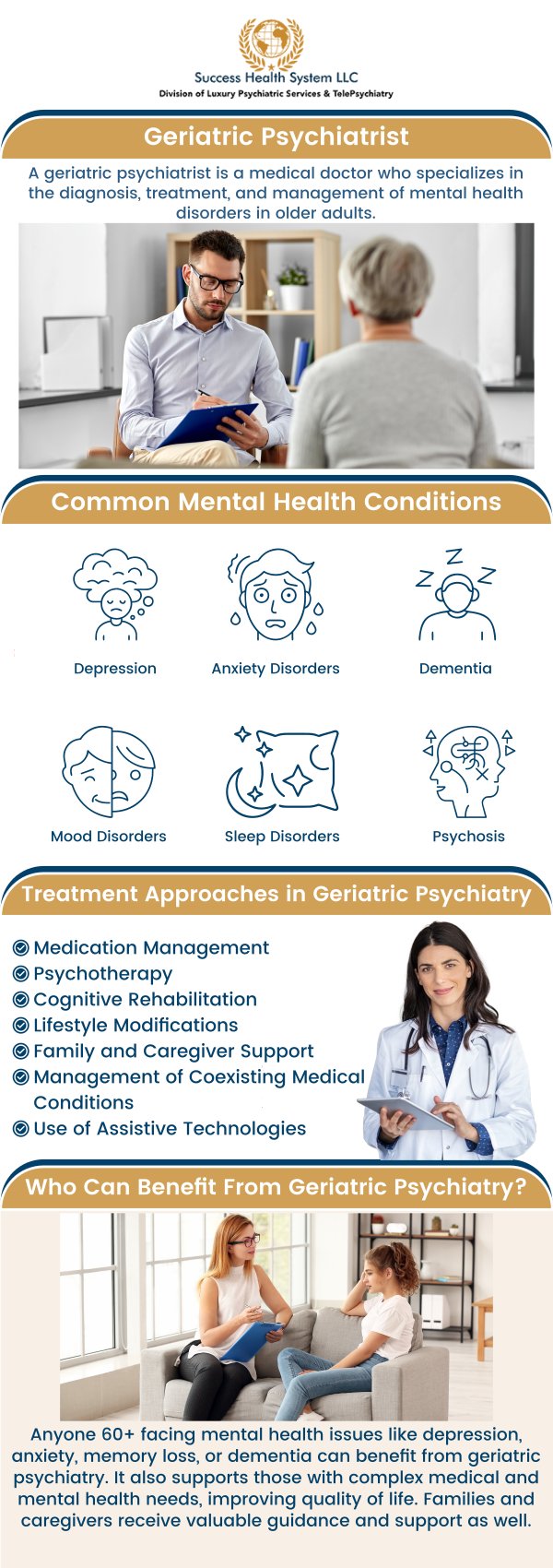Trusted Geriatric Psychiatrist in Creve Coeur, MO
At Success Health System, our geriatric psychiatrist, Dr. Moses Tabe, provides specialized care for the unique mental health needs of older adults. Board-certified and highly experienced, Dr. Tabe is dedicated to helping seniors navigate the complexities of aging with compassion and expertise. Whether addressing depression, anxiety, memory concerns, or other mental health challenges, Dr. Tabe creates personalized treatment plans that enhance quality of life and promote overall well-being in the golden years. Contact us for more information schedule an appointment online. We are conveniently located at 12401 Olive Boulevard, Suite 206, Creve Coeur, MO 63141.




Table of Contents:
What does a geriatric psychiatrist do?
What conditions do geriatric psychiatrists treat?
What are the three most common diagnoses in geriatric psychiatry?
At what age should you start seeing a geriatric psychiatrist?
A geriatric psychiatrist specializes in the prevention, diagnosis, and treatment of mental health issues unique to elderly patients, typically those aged 65 and over. Their expertise lies in understanding the complexities associated with aging and its impact on mental health. They are skilled in assessing, diagnosing, and treating a wide range of mental health conditions, including depression, anxiety disorders, dementia, delirium, mood disorders, substance use disorders, bipolar disorder, schizophrenia, and dementia-related disorders such as Alzheimer’s disease. Utilizing various tools such as mental status exams, physical exams, and laboratory tests, geriatric psychiatrists can achieve accurate diagnosis.
Treatment typically involves the development and implementation of individualized treatment plans, which may include psychotherapy, medication management, lifestyle interventions, and other non-pharmacologic treatments.
A significant part of a geriatric psychiatrists’ work is dedicated to cognitive disorders like Alzheimer’s disease, vascular dementia, and Parkinson’s disease. These progressive neurodegenerative disorders often present with memory loss, confusion, and behavioral changes that can cause significant distress for patients and their families. By providing comprehensive care and support, they aim to alleviate this distress and improve their patient’s quality of life.
They can also treat mood disorders such as depression and bipolar disorder, which are commonly encountered in older adults. They are adept at recognizing the signs of these conditions, even when they are overlooked or mistaken for a normal part of aging.
Anxiety disorders, obsessive-compulsive disorder, late-life schizophrenia, and sleep disorders also fall within the area of expertise of a geriatric psychiatrist. They understand the profound impact these conditions can have on a person’s life and are committed to identifying and managing them effectively.
Dementia, which describes a significant decline in cognitive abilities, is the most common diagnosis. The majority of these cases are Alzheimer’s disease, a specific type of dementia that accounts for 60-80% of cases. It’s essential to note that while memory loss often accompanies dementia, not all memory issues are indicative of this condition.
Depression is another prominent issue in geriatric psychiatry. Older adults may face certain life changes that can trigger feelings of depression, such as the loss of loved ones, health complications, or changes in living situations. It’s important to note that depression symptoms in older adults may manifest differently than in younger individuals, often appearing more physically as sleep disturbances or loss of appetite.
Anxiety disorders, ranging from generalized anxiety to specific phobias, are also common among the older population we serve. These conditions can cause significant distress and impact daily life, even in the absence of major life changes.
While there is no fixed age for when individuals should first consult a geriatric psychiatrist, it’s generally recommended that individuals start seeing a geriatric psychiatrist around the age of 65. This recommendation is because the risk of developing mental and emotional disorders such as dementia, Alzheimer’s, depression, and anxiety significantly increases as one ages. However, certain milestones, like reaching the age of 70, may also warrant an evaluation with a geriatric psychiatrist, even in the absence of apparent symptoms.
Age isn’t the only factor in mental health, as health status, family history, and personal issues also influence it. Some individuals may need to be seen before 65, especially if they have significant health issues or a family history of mental disorders.
Proactive screening and early intervention are crucial in managing age-related mental health conditions. If you notice any of the following signs or symptoms in yourself or an elderly loved one, it may be advisable to schedule a consultation:
• Persistent memory loss or confusion
• Difficulty concentrating or making decisions
• Mood swings, irritability, or depression
• Sleep disturbances
• Anxiety, fear, or paranoia
• Hallucinations or delusions
• Decline in self-care or social engagement
• Risky or impulsive behaviors
Early assessment and intervention are essential for successful outcomes in geriatric psychiatry. By seeking professional help, seniors can benefit from personalized treatment strategies that promote their quality of life, preserve their independence, and enhance their overall mental health. Contact us for more information schedule an appointment online. We are conveniently located at 12401 Olive Boulevard, Suite 206, Creve Coeur, MO 63141. We serve patients from Creve Coeur MO, Overland MO, Bridgeton MO, Clayton MO, Kirkwood MO, Chesterfield MO, Clarkson Valley MO and surrounding areas.

Check Out Our 5 Star Reviews


Additional Services You May Be Interested In
▸Addiction Treatment
▸ADHD Treatment
▸Anxiety Treatment
▸Bipolar Disorder
▸Depressive Disorders
▸Mental Disorder
▸Obsessive Compulsive Disorders
▸Psychotic Disorders
▸PTSD Treatment
▸Phobias and Fears Therapist
▸Psychiatrist
▸Substance Disorder
▸Social Anxiety Psychiatrist
▸Medication Management
▸Psychotherapy
▸Exomind TMS – Columbia
▸Spravato – Independence

Additional Services You May Be Interested In
▸Addiction Treatment
▸ADHD Treatment
▸Anxiety Treatment
▸Bipolar Disorder
▸Depressive Disorders
▸Mental Disorder
▸Obsessive Compulsive Disorders
▸Psychotic Disorders
▸PTSD Treatment
▸Phobias and Fears Therapist
▸Psychiatrist
▸Substance Disorder
▸Social Anxiety Psychiatrist
▸Medication Management
▸Psychotherapy
▸Exomind TMS – Columbia
▸Spravato – Independence





